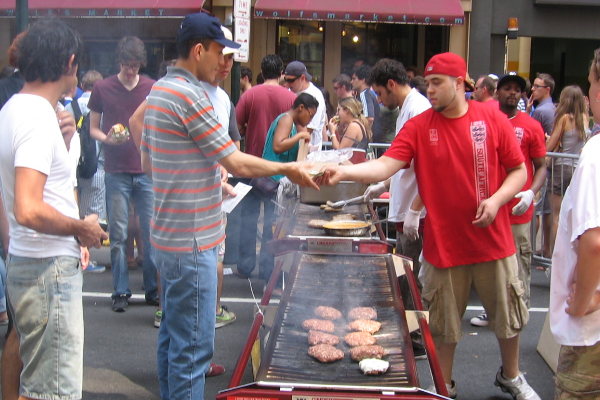Food festivals are a fabulous way of increasing your bottom-line, working in partnership with other businesses, raising your profile, and doing something great for the community. You may be a street vendor working on your own or with others, a pub landlord, or leisure or hotel venue but, whatever your starting point, it may be worth looking now at making plans for setting one of these up for when the weather gets warmer next year.
Food festivals are all about celebrating and enjoying food. Often, they are some of the only places that bring producers and consumers together under one roof. For wannabe food festival organisers, we’ve got some helpful hints and tips that should give you food for thought if you’re interested in creating your own event in 2020.
One of the first things to do is to make sure that it’s a good, viable idea and that there is a real need for your food festival venture. Start by asking some key questions:
Why are you organising a food festival? Does it clash with any other events? Who do you want to attract? What size and scale will this event be? Will it support a charity? Share your objectives with everyone involved in organising your event, keep it in mind to keep you on track as you progress, and use this information to evaluate success at the end.
What is the event name and structure? Most festivals include their location in the name.
Who is your audience and what is your theme? Be clear about who your event is targeting. Consider age, gender, income level, and location. Once you have decided on your audience, you will have a better understanding of what you will provide to attract them, and how to reach them. Will there be food only, alcohol, live music?
Think about what is unique about your offer to draw crowds. For example, the Baltic Herring Festival in Helsinki continues a Finnish tradition when, since 1743, fisherman relied on selling their wares at the festival to determine the price of fish for the whole country. Today, this is part of a week-long celebration not only of seafood but also storytelling, musical theatre performances, stand-up paddling and rowing.
When will it be, where will it be, who will be in your organising team?
Once you have carefully considered this, and you are still totally committed to pressing ahead, it’s time to move on to the business planning. Make sure you have a robust and detailed business plan that covers your projected footfall and required spend to make the event profitable.
How will you finance the event? If you don’t already have the funds, you could look to partner with other local businesses or consider public funding, ensuring you find out application deadlines and eligibility criteria. Alternative forms of revenue include ticket sales, bar sales, and charging a pitch fee to producers.
What is your budget? Be realistic and be creative. Do your research to find out how much different elements of the event will cost, and work out what you can afford. And don’t forget the all-important marketing – do you have the skills and budget to take this event out to the people you want to attract, or do you need to hire professionals for marketing strategy, brand and design, communications and advertising, and social media. Make doubly sure that you have thought about risk assessments, insurances, health and safety and any other legislation that will impact on the food festival.
If you would like to make your own dream food festival a reality, there’s plenty of reading online to give practical support and get the creative juices flowing and don’t forget that Cinders can help too with a wide range of commercial outdoor cooking equipment, accessories and the portable StreetWok LP20.
Thank you for reading this Cinders BBQ blog. Click here to read more or Contact Us today with any questions that you may have.

